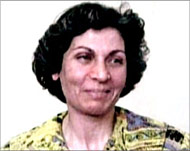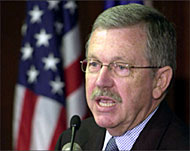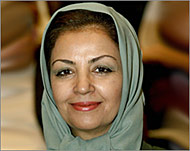Iraqi scientists’ detention questioned
Former chief arms inspectors David Kay and Hans Blix are questioning the continued detention of a dozen Iraqi weapons scientists by US forces.

This comes more than a year after the prisoners first told interrogators Iraq had no outlawed weapons – a story that turned out to be true.
“What are the accusations?” ex-UN inspector Blix asked in an interview on Friday, referring to one leading Iraqi prisoner, Amir al-Saadi.
Kay, former head US arms investigator, told The Associated Press that “I saw no reason to hold them” even nine months ago.
The continued detention of the scientists without charge and largely incommunicado 17 months after the fall of Saddam Hussein’s regime, appears to violate international law, Amnesty International said.
Lieutenant Colonel Barry Johnson, a spokesman for the US military command in Baghdad, said on Friday: “Depending on how you count, there are between eight and 12 detainees in Iraq who can be considered weapons scientists.”
He said they were held under the UN Security Council resolution that empowered US-led forces to intern people considered a threat to the security of the Iraqi government.
Johnson has not elaborated on the threat they might pose, nor would he provide names, except to reconfirm that one, Rihab Rashid Taha, who worked on Iraqi biological weapons, is among 14 “high-value” detainees being reviewed for possible release soon.
War rationale
New attention has focused on Taha and another imprisoned woman scientist, Huda Salih Mahdi Ammash, a political figure in the old regime, because kidnappers who beheaded two American hostages in the past week had demanded the release of female detainees in Iraq.
 |
|
Rihab Rashid Taha is among one |
The US military says the two scientists are the only women it holds among a detainee population of about 5000.
In April 2003, the US invasion force began rounding up scores of Iraqi scientists, engineers and technicians who might have information about nuclear, chemical or biological weapons programmes.
US arms experts under Kay then arrived to try to substantiate the Bush administration’s claim – its chief rationale for war – that Iraq had chemical and biological weapons and a nuclear-bomb programme.
Al-Saadi, Iraq’s point man in dealing with UN arms inspections before the war, surrendered to US troops on 12 April 2003. Before being taken away, he told German television: “There were no weapons of mass destruction, and time will bear me out.”
Intelligence value?
By last January, after most scientists were freed, Kay agreed, concluding in congressional testimony the alleged WMD did not exist. His successor in the arms hunt, Charles Duelfer, has reached the same conclusion, according to recent Washington news leaks of his findings.
 |
|
David Kay sees no reason for |
Speaking of the still-detained scientists, Kay said on Thursday that by the time he quit his post last December, “there was no substantial new intelligence value to come from them.”
“My own input” – to the US military – “was that I saw no reason to hold them,” Kay said. “If the Duelfer report says what the press says it will say, I don’t see how you’d continue to defend the US holding them.”
He noted that Iraq’s government might choose to detain scientists to try them for any past misdeeds. But the interim Baghdad regime has given no indication it plans to do so.
Accusations questioned
Blix particularly questioned the continued detention of al-Saadi, with whom Blix dealt regularly while leading UN arms inspections in Iraq before the war.
 |
|
Huda Ammash was a key figure |
“He did say at all times in our talks that there were no weapons of mass destruction,” the Swedish diplomat and arms specialist said, speaking from Stockholm. “And that should not be held against him because he told the truth.
“I feel concerned,” he added. “I would like to know, what are the accusations? They’ve held this man incommunicado, as far as I know, for over a year.”
Amnesty International says the scientists’ lengthy detention seems prohibited under international humanitarian law, specifically the International Covenant for Civil and Political Rights’ stricture against arbitrary arrest.
“If they’re being held solely for information extraction, this would be against international law,” said Nicole Choueiry, a spokeswoman for the prisoner rights organisation in London. “Under international law, no one can be held indefinitely without charge.”
Stunt claim
Kay, who interviewed al-Saadi during the Baghdad investigations, described the British-educated chemical engineer, in his mid-60s, as “very cultured, very smart, quite sure of himself.”
|
“If they’re being held solely for information extraction, this would be against international law. Under international law, no one can be held indefinitely without charge” Nicole Choueiry, |
Before the war, al-Saadi dismissed US officials’ supposed evidence of Iraqi WMD as “stunts”. Of Secretary of State Colin Powell’s pre-war UN presentation on 5 February 2003, al-Saadi said: “Quoting ‘our sources, our sources, our sources,’ without any convincing evidence – as if that in itself is enough to convince the world.”
Ironically, al-Saadi may be one of the last to hear that time has borne him out. His German-born wife, Helma, tells reporters her husband is denied access to news from outside, except for family news in letters delivered on her behalf by the Red Cross.
The British-educated Taha, dubbed “Dr Germ” by UN inspectors in the 1990s, ran the Iraqi biological weapons facility where scientists produced anthrax and botulinum toxin in the 1980s.
The other woman scientist, Ammash, who holds a microbiology doctorate from the University of Missouri, also worked in the weapons field, but was better known as a member of the ruling body of Saddam’s Baath party.